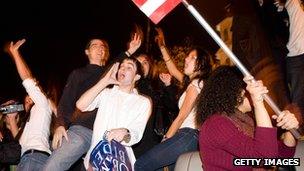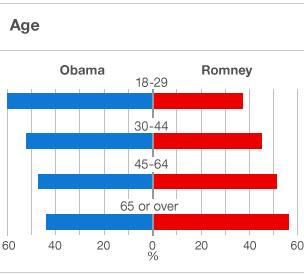Viewpoint: Hoping for change, and coming up short
- Published

Author Kayla Ruble says her enthusiasm for Obama has waned, but she still voted for him
This time around, voting for Obama was much less emotional for one young American. Kayla Ruble explains why the thrill is gone.
Four years ago, I was a junior at the historically conservative Miami University in Ohio, the alma mater of none other than former vice-presidential candidate Paul Ryan. As a liberal, I had grown accustomed to being the ideological outcast in the rooms full of suburban conservatives.
I had quietly waited out the final years of the Bush administration as the clock ticked towards what I hoped would be a dramatic change in American politics.
Then, on 6 Nov, 2008, I followed the national election returns from the living room of my chaotic, condemnable college house. By 23:00 all the networks were declaring Barack Obama the country's next president.
I was overcome with emotion. We had elected our first black president. We had come together and voted for a candidate whose platform included universal health care, ending the wars in the Middle East and curbing climate change.
As the Obama campaign had been fuelled by college students, I felt I had a personal stake in his victory. There would surely be tough political battles ahead, but I was positive change was on the horizon. My faith had been restored in a lot of the country
At first it seemed like my faith was well-placed: within the first few months of his presidency, Obama led the way on economic policy I believed in, from the stimulus package to bailing out the auto companies.
I was shocked and thrilled when he started making headway on the Affordable Care Act, following through on one of his biggest campaign promises. Even minor policy resonated with me, like making emergency contraception available over the counter, something I had argued for as a 16-year-old Planned Parenthood volunteer.
Despite those important achievements, I started losing hope. Obama and his administration appeared unable to change Washington culture.
Instead, that culture seemed to change him.

In 2008, young people were energised by Obama's election
I thought the president compromised too much on the health care bill and didn't work hard enough to close Guantanamo Bay. He let big banks off the hook for their reckless activity, something that I would have expected from the Bush administration, not President Obama.
I had naively expected that Obama would be immune to the games of Washington, but he now appeared incapable of overcoming the partisan gridlock. He was failing to find enough bipartisan support to pass bills or approve his appointments.
I moved to Santiago, Chile in the summer of 2010, watching from afar as Obama's momentum seemed to wane. Following American politics from halfway across the globe, I felt even more disillusioned.
I started seeing the American political process as petty and insignificant. In Santiago, foreign investment was funnelling in and buildings were going up, while back home Congress was digging its heels in the ground over debt ceiling negotiations.
By the time the campaign was in full force this summer, I had grown bored with the obsessive media coverage. I tuned out of the pundits and attack ads, only checking occasional poll numbers.

2012 Voter turnout, as organised by age. Young voters were still motivated to vote for Obama in this election, but expectations have changed
In 2008, I hung on every word from candidate Obama's mouth, but by 2012 I found myself uninspired by his speeches and ideas.
In 2008, I stopped biting my tongue in political science classes and began speaking out in favour of the candidate I supported. By 2012, I rarely cared to engage in debate with Obama critics.
My stake in the election became less about believing in the campaign, and more about deciding he was just the better option.
A thread of hope remained that Obama had held back in his first term, and planned for a more progressive agenda once he was safely re-elected. And much as Obama disappointed me with all the political posturing, Mitt Romney's conservative standpoint on important issues had me concerned.
I decided Obama would, at the very least, keep us from turning back the clock on so many important issues.
In 2008, I was young and easily swept up by an energetic campaign. Then the campaign fervour died down and the reality of American politics set in - and with it, my disappointment.
I remain pessimistic about the inefficient state of American politics. But the candidate I voted for then is still the candidate I want in office today.
Then, as the results came in, I called my parents to rehash all the details. I stayed up watching every analysis, speech and statement.
Four years later, the election was once again called in Obama's favour. But this time, all I could do was breathe a sigh of relief.
Kayla Ruble is a multimedia journalist based in New York City. She is currently an assistant producer with Film@11, a documentary production company.